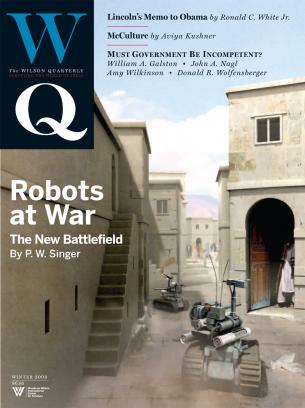Robots at War


An art historian considers the accomplishments of Marc Chagall, perhaps the most famous Jewish artist of the 20th century, but one whose best work was already behind him by the end of World War I.
The notion that all young people are technological whiz kids is flawed, says a UVA media studies professor. "Every class has a handful of people with amazing skills and a large number who can't deal with computers at all."
Apologizing for wrongdoing has become so commonplace, writes historian Wilfred M. McClay, that forgiveness is in danger of "being debased into a kind of cheap grace."
The median age of classical music listeners has gone up in the last few years, but then, so has the median age of all Americans.
Why would France waste resources on such an economically and politically marginal issue as banning headscarves in schools?
In November 2008, voters in the state of Washington joined neighboring Oregon in passing a "death with dignity" law. The original law, a decade old, has transformed the treatment of the terminally ill.
In the 38-year war on cancer, improved screening was the single most important change and one of the biggest bargains.
A veteran White House press secretary thinks it is time to blow up the 35-year-old model of having one overexposed spokesperson be ground zero for every question.
New research reveals that spice was not used in medieval times to mask the taste of rancid meat, but rather to infuse good meat with the sweet-sour flavor that was the epitome of the fashionable cooking of the era.
The wisdom of employing an Iraq-like surge in Afghanistan.
Doubling the budget of the National Institutes of Health during the Clinton and Bush administrations has had the curious effect of leading to less biomedical research.
The most optimistic national estimatesshow Russia’s population falling to 136 million in 2020, down from 141 million today. Life expectancy in Russia is among the lowest in the developed world.
Fixing schools may mean sticking to the "no excuses" model: the philosophy that every child can succeed and neither family dysfunction nor poor preparation is sufficient reason for failure.
In Dnepropetrovsk, the secret rocket-making city in eastern Ukraine that, during the Soviet era, was closed to outsiders, the rock musical Jesus Christ Superstar is credited with an underground evangelicalism that took hold among the youth during the 1970s.
Researchers investigating the "broken windows theory" of crime control found that people are twice as likely to steal from a graffiti-covered mailbox as from one that's pristine.
Just as you always suspected, referees really do favor the home team.
Some critics decry political propaganizing by college professors but a study confirms that students are not being swayed.
Some political scientists have called for compulsory voting to force citizens to participate in the electoral process. It won't work.
State governments think it makes sense to consolidate local governing bodies, but at the local level the benefits seem abstract and largely unproven.
Mortgage delinquency rates are bad, but not nearly as bad (yet) as they were during the Great Depression.
Self-propelled semi-submersibles--primitive subs that ride low in the water--are a favorite choice for drug movers along the Colombian coast. They may pose a serious threat to American national security.
HORSES AT WORK
Harnessing Power in Industrial America
By Ann Norton Greene
Illustrated. 322 pp. Harvard University Press. $29.95
A. J. Loftin reviews a history of witch-hunting, concluding that "If witches existed, John Demos would have found them."
Eric Liebetrau assesses Jay Parini's quest to find thirteen books that changed America.
Max Byrd says that biographer Jon Meacham sums up Andrew Jackson's antithetical personality: "commanding, shrewd, intuitive yet not especially articulate, alternately bad-tempered and well-mannered."
Allison Herling Ruark and Daniel Halperin on AIDS in Africa.
Brooke Allen reviews two biographies of a man we thought we knew, Samuel Johnson.
Grant Alden ultimately applauds a book that helps us understand something about the carefully crafted visuals that have become so much a part of our shared culture.
Geoff Manaugh examines a "historically important, well-timed, and memorable addition to the growing library of books about water and the West."
Ruth Levy Guyer on the history of anesthesia.
In the global war on terror, no country looms larger than Pakistan, and in Pakistan, no institution looms larger than the army.
David Garrow on the forgotten struggle for civil rights in the North.
William Anthony Hay on the decline and fall of the British Empire.
The most brilliant policies will fail if government does not attract talented people and free them to do their best work.
There are five maxims the federal government can follow to regain the public confidence it has lost over the past four decades.
Americans love to complain about gridlock in Washington and partisan warfare between presidents and Congress. Yet the record suggests that unified party government is no panacea.
On the bicentennial of Abraham Lincoln’s birth, a distinguished biographer muses on the counsel the Great Emancipator might offer the new president who so often invokes him.
Americans have developed an admirable fondness for books, food, and music that preprocess other cultures. But for all our enthusiasm, have we lost our taste for the truly foreign?
America’s national security structure is designed to confront the challenges of the last century rather than our own.
A new way of war is on the horizon. Already, robots and drones are replacing human pilots and foot soldiers in some roles, and in the future they will take over many more. The benefits of removing human soldiers from harm’s way are obvious. But there’s a price to pay when a society can wage war by remote control.